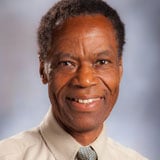In which online program(s) do you teach?
- B.S. in Communication – Public Relations
Which classes do you teach online?
Communication Theory, Interpersonal Communication and Nonverbal Communication
In what ways do you connect with online students?
By email, announcement page, Zoom and other forms of social media.
What do you want your students to take away from class?
First, communication is foundational to all of human activities. Second, communication theories can help explain and enhance communication practices. Third, effective and appropriate communication significantly improves the quality of our personal and social relations.
Why did you start teaching?
I decided to go into teaching as a result of the influence of my sister and some other teachers who taught me by their examples that teaching is a caring relationship that can transform people into vibrant and productive citizens.
What advice would you give to your online students?
First, you can do it if you set your mind on it. Second, always seek the connection between theory and practice. Third, you will find that the present sacrifice (or pain) is worth the reward (or pleasure) to come. Fourth, when you are through, find ways to give back.
What qualities make someone particularly successful in the field in which you teach?
Based on the assumption that the educator is qualified in his/her field, one quality is caring. I have heard it said that "Others will not care how much you know until they know how much you care." Another quality is humility. No matter how much one knows, there is still much more to know. Therefore, a successful educator is a life-long learner who is humble enough to learn even from those s/he seeks to educate. A third quality is empathic listening. I believe the ability to patiently listen to and connect with the struggles and successes of others is essential to knowing how best to instruct them.
What is the one book you think everyone should read?
“Time for Truth: Living Free in a World of Lies, Hype and Spin” by Os Guinness. (2000)
What do you do when you need a laugh?
I play a game with two of my colleagues or I engage in phone conversation with one of my best friends. We always have much to make us laugh.
Tell us something your students may not know about you:
I was orphaned at the age of seven, dirt poor, and I didn't really have a plan for getting from one point to another. The youngest of my three elder sisters saw to it that I finished primary school. The decision to attend secondary school was more by providence than planning. The same sister paid my way through. I began fending for myself after that and after working for three years I ventured to attend a vocational training school where I learned shorthand writing and parliamentary procedures. The training resulted in my getting a job as an official reporter. By the standard and situation at that time, it was a well-paying job, but I did not feel fulfilled. At the age of 29 I made the decision to leave job and country and come to the United States to study communication. Initially, I wanted to be a broadcaster because I grew up under the influence of transistor radio. As I studied in college, I discovered other aspects of communication and that was how I continued to earn my doctoral degree in communication studies.
